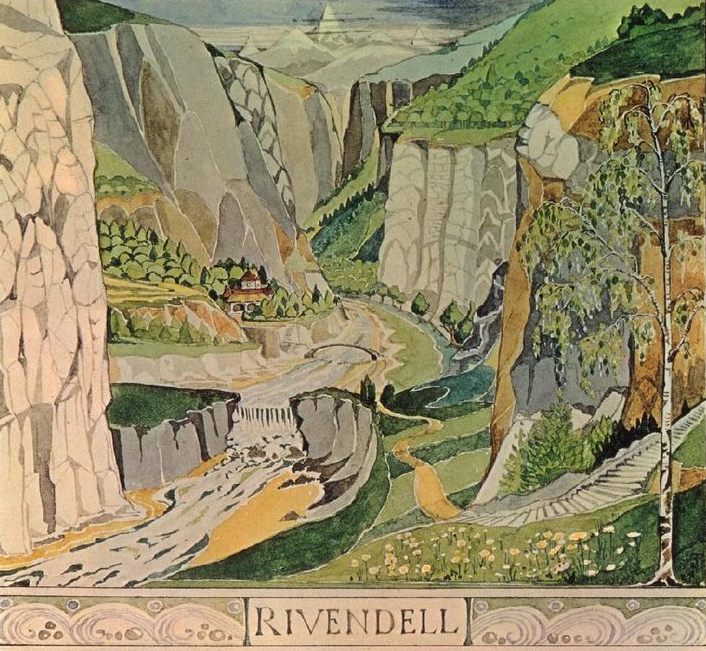The Fall of Magic
J.R.R. Tolkien, Rivendell
Some divide the fantasy literature from which D&D sprung into two broad categories: Tolkien or Howard. I appreciate both, but my Lands of Khos campaign will look more to Tolkien and his predecessors. An age undreamed of precedes each, but their sense of what has been lost differs. For Howard’s Conan the past is unfathomable, mysterious and of an equally amorphous moral fiber as his present Hyborian Age. With Tolkien’s Third Age, even victory over a clear Manichean blight was accompanied by a sense of loss about what too was passing away from Middle Earth.
I’ve run enough old school fantasy RPG games to feel both thrill and anxiety at what sometimes follows the first steps of campaign’s long road. For the short arcs and one-shots of the myriad small-press RPGs I’ve reveled in the past fifteen years, I’ve learned to welcome character decisions that can’t be taken back. For the long-form sandbox campaign I have in my mind’s eye, however, I want to be careful about the “toys” I place within. Maybe I’ve simply read too many threads about Rings of Invisibility or Brooms of Flying and such. I want the PCs to be able to utterly transform their Age but am wary of adding permanent elements to an ongoing campaign that might bring harm to the overall endeavor by taking focus away from the characters and putting it on their toys.
Hence, “The Fall of Magic”. The Elves of Khos have almost entirely “gone west” to their Feywild and magic is passing away from this world. This will reinforce themes of loss and decay as well as create escape clauses for my mad experiments.
What does this mean in practical terms?
Along with traditionally consumable items like wands and “potion growlers,” most magical items will have one of the six classic polyhedral dice ascribed to them, e.g. “Helm of Telepathy (d10)”, Gauntlets of Ogre Power (d20). Each time an item is activated, the assigned die size will be rolled and if it comes up a “1” or “2” then the die size will be decremented one size until it reaches a d4. When such a diminished item is risked further, on a “1” or “2” result its magic will depart and the item will either break or be inert. The default activation time will be one turn or one use as appropriate, but might vary according to the nature of the item. Even magical weapons and armor will need be “called upon” and stoked to power before a fray.
I was in a campaign several years ago that used a form of this rule to track ammo. Rather than having 20 arrows and having to account carefully for each single arrow, people had, for example, Arrow Quiver (d12) and would roll at the end of a combat to determine whether their ammo had diminished sufficiently to decrement their quiver to a “d6”.
I asked on Twitter about the origins of this kind of a mechanic and heard back that Confrontation had a form of it, that Logan Knight and James Young later used it to track torches at their tables & that David Black’s The Black Hack may have been the first published old school FRPG to use something similar. Apart from the aforementioned campaign, I think I re-discovered it elsewhere.
I’ve not considered it much, but it occurs to me now that so long we’ll be taking the time for such decrement checks, some other result (4s?) might result in a “flare” and/or a side-effect for some items as one finds with house rules or systems where magic is unpredictable (Dungeon Crawl Classics excels in this kind of thing).
The “breaking weapons” element in The Legend of Zelda: Breath of the Wild game received mixed reviews. Players seemed to either enjoy or dislike the feature. It wasn’t implemented exactly the way I might have chosen, but I appreciated its design intent & thought it was mostly successful. Facing a given conflict, I liked having to choose whether to end it quickly and with less risk by using a superior weapon or to “keep my powder dry” by charging in with a humble Moblin club.
I felt the draw of this kind of design aesthetic recently while watching a playtest of Agon 2nd Editon. Deciding moment by moment, situation by situation, whether to exhaust a resource or reserve it and increase one’s risk of loss is powerful.
When at its best, two hearts of good old-school role-playing are managing resources and putting meaningful decisions into the hands of players. I hope to infuse more of both by basing my game in a world where magic is dying.
Incidentally, while far from the old school (closer to freeform academy), the Fall of Magic is a stellar RPG, a favorite of mine, and one I hope to to return to. It’s a game that evokes for me that Tolkien-esque sense of loss of a world which is passing away.
